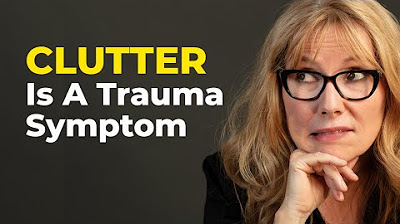How To Declutter When You Feel Like A Failure | Monica Fay | TEDxSouthHowardAvenue
Summary
TLDRThis transcript explores the complex relationship we have with clutter and mess, encouraging a shift in perspective. It challenges the common notion that clutter reflects personal failure, proposing instead that it serves as valuable information about our lives, emotions, and circumstances. The speaker, a professional organizer with ADHD, shares insights on how clutter often stems from deeper issues such as trauma, mental health struggles, and societal pressures. By embracing clutter as a reflection of our personal history rather than a sign of inadequacy, we can make informed decisions about what to keep and let go, fostering a healthier relationship with our possessions and ourselves.
Takeaways
- 😀 Clutter is not a personal failure, but rather a reflection of your life circumstances and emotional state.
- 😀 Viewing clutter as 'personal information' helps us understand what may be affecting our lives, rather than judging ourselves for it.
- 😀 Clutter can stem from a variety of sources including ADHD, depression, trauma, burnout, and societal expectations.
- 😀 Seeing clutter as a personal history gives us the ability to heal, rather than just organizing it away.
- 😀 Everyone experiences disruptions in executive functioning, which can affect our ability to manage clutter, not just people with ADHD.
- 😀 Society’s expectations and pressures about how a home should look often contribute to clutter, as we try to meet unattainable standards.
- 😀 Decluttering doesn't require being a minimalist or using perfect organizational systems; it’s about connecting with what’s most important to you.
- 😀 It's essential to unlearn societal ideas about possessions and embrace personal ways of organizing and letting go.
- 😀 The act of decluttering helps build self-confidence and decision-making abilities, showing that we can decide what stays and what goes.
- 😀 Community support, like shared decluttering experiences, can be a powerful motivator and provide emotional healing during the process.
Q & A
Why do people often apologize for their clutter when others visit?
-People apologize for their clutter because they feel vulnerable about the mess, fearing it reflects a personal flaw or a lack of control. Clutter is often associated with not having it 'together' and can trigger feelings of shame.
How does clutter impact our perception of ourselves and others?
-Clutter can make us feel that we are a 'mess,' which influences our self-esteem and how we think others perceive us. It leads to judgments about laziness or irresponsibility, both for ourselves and for others.
What is the key shift in perspective that the script suggests regarding clutter?
-The script encourages viewing clutter as personal information rather than a personal failure. It suggests seeing clutter as a reflection of our history, struggles, and life circumstances, rather than something to be ashamed of.
What role does society play in how we view and accumulate clutter?
-Society influences our clutter through cultural expectations, social norms, and pressures to maintain perfectly organized homes. We are conditioned to think that our homes should look a certain way, contributing to unnecessary accumulation and disorganization.
How does ADHD influence one's relationship with clutter, according to the speaker?
-The speaker, who has ADHD, highlights that ADHD affects executive functioning, including the ability to plan, organize, and complete tasks. This disruption leads to challenges in managing clutter, making it harder to maintain organized spaces.
Why is it important for professional organizers to see a client's home in its current state, without prior cleaning?
-Seeing the home in its unaltered state provides valuable information about the client's life, struggles, and emotional attachment to their things. It helps the organizer understand the context behind the clutter and create a more personalized solution.
What emotional factors contribute to the accumulation of clutter?
-Emotional factors like sadness, depression, trauma, or anxiety can contribute to clutter. People may hold onto items as a way of coping with emotions, preserving memories, or preparing for uncertain futures, which can lead to overaccumulation of possessions.
What societal expectations can lead to the accumulation of unnecessary items?
-Societal expectations, like keeping things 'just in case' or maintaining appearances, can lead to the accumulation of items. For example, keeping clothes in hopes of returning to a certain body size, or holding onto books to project intelligence, are ways society shapes our behavior around possessions.
How can viewing clutter as information help in the decluttering process?
-Viewing clutter as information allows individuals to understand that the mess reflects deeper emotional or life circumstances. This perspective helps reduce shame and guilt, making it easier to let go of items and address the root causes of clutter.
How does community play a role in overcoming clutter, according to the script?
-Community provides support and shared experiences, making the decluttering process less isolating. The script highlights how people in a community setting can encourage each other, share their struggles, and gain empowerment through collective effort and mutual understanding.
Outlines

This section is available to paid users only. Please upgrade to access this part.
Upgrade NowMindmap

This section is available to paid users only. Please upgrade to access this part.
Upgrade NowKeywords

This section is available to paid users only. Please upgrade to access this part.
Upgrade NowHighlights

This section is available to paid users only. Please upgrade to access this part.
Upgrade NowTranscripts

This section is available to paid users only. Please upgrade to access this part.
Upgrade NowBrowse More Related Video

Akıllı İnsanlar Neden Umursamaz? Stoacı Bilgelik - MARCUS AURELİUS

I and Thou: Martin Buber's Philosophy of Dialogue

Heal Chaos and Overwhelm: DECLUTTER Every Part of Your Life

Alan Watts - Don't Take Life too Seriously

MÒDULO 4 T 4

Ngabuburit - Melihat KE BAWAH untuk BERSYUKUR, Melihat KE ATAS untuk TERUS TUMBUH
5.0 / 5 (0 votes)